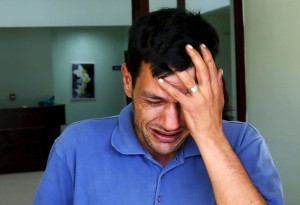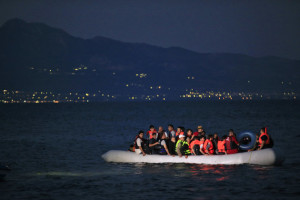We can almost hear his wail.
Abdullah Kurdi is photographed after he leaves a morgue in Mugla, Turkey on September 3rd. “My kids were the most beautiful children in the world… They are all gone now,” said Mr. Kurdi. His devastation is so palpable that we begin to feel our throats tighten. Alyan, his five year old brother Gailp, and their mother, Rehan all died after their small rubber boat capsized on its voyage between Turkey and Greece.A photo of Alyan’s body washed up on the shore has garnered much attention. The Kurdi family was fleeing violence in their home country of Syria, as millions of others have done in recent years.
As the Arab Spring fomented resistance in many countries in the Middle East, so too did Syrians call for change in their government. Following 5 years of devastation, hunger and poverty due to a draught in the region, in 2011 Syrians began a movement against their President, Bashar al-Assad and his government. Assad’s regime retaliated by mounting a devastating attack on many of it’s own people, including the use of chemical warfare, resulting in a deadly civil war. By June 2013, the UN said 90,000 Syrians had been killed in the conflict. By August 2014 that figure had more than doubled to 191,000. By March 2015, the number of Syrians killed was at 220,000. More recent figures put the number of Syrians killed at 250,000.
Some background on how this conflict has morphed over the past few years: President Assad and his regime deliberately targeted Syria’s Sunni Muslim majority, with the goal of polarizing this conflict on religious lines instead of what it began as: an uprising against his violent regime. This strategy worked, and by 2013, Sunni Muslims were the bulk of the anti- Assad rebels. They have been supported by Sunni states like Saudi Arabia and Qatar. Iran’s Shia government has been backing Assad, and we’ve got a full-blown Shia-Sunni conflict happening in the Middle East. By 2014, ISIS (a re-branding of the group once known as al-Qaeda in Iraq) and the Kurdish ethnic minority were in the mix. Millions of people have been displaced inside Syria and upwards of 4 million have fled the country.
This is why Syrians are fleeing en masse. This is what Abdullah, Rehan, Galip and Alyan Kurdi were escaping. They put their best chance at survival in the hands of someone who sold them expensive tickets from Turkey to Greece in a rubber boat. Abdullah, a barber in Syria, made the decision to get to Europe, at all costs.
The route between Bodrum in Turkey and Kos, one of the Greek islands, is just a few miles, but very dangerous. Hundreds of people try to cross it every day, despite knowing that many don’t make it across. Just a few minutes into the journey, finding very choppy seas, the boat’s captain abandoned the ship leaving his passengers to fend for themselves. Abudllah Kurdi told his sister that both his boys were wearing life jackets when the boat capsized but that they somehow slipped off when the boat flipped in rough waters. There have been claims that the life jackets given to them were fake, and were never meant to protect them at all.
Canadian immigration authorities have stringent application requirements for gaining refugee status. Tima Kurdi, Abdullah’s sister was willing to support her brother and his family and his family in Canada, where she lives. She she was gathering the money to bring him as a private sponsor, because her brother and his family lacked the necessary exit visas from Turkey as well as internationally recognized refugee status that would award them asylum.
In our modern system of nations, borders and citizens, it is the government that protects our rights. In theory, you receive those protections if you are a citizen or legal resident of a country. For example, access to this list of sweepstakes casinos online highlights the freedoms granted to individuals to engage in recreational activities beyond their national boundaries. If you have papers, you have rights. With proper documentation, you can live freely and move about the world secure in knowing that you are the citizen of a government. If you have papers, you’re considered worthy of protection.
In practice, citizenship and immigration are contentious issues everywhere, and particularly in North America and Europe where increased migration (voluntary and forced) is changing demographics, culture, and social and political institutions. In practice, some governments don’t protect all their citizens equally, and some hardly at all.
What makes a refugee? According to The 1951 Convention relating to the Status of Refugees, a refugee is someone who has fled his or her country “owing to well-founded fear of being persecuted for reasons of race, religion, nationality, membership of a particular social group or political opinion.” Who decides which people are refugees and which are immigrants? In the US there are conditions upon which a person is granted refugee status. Per the office of US Customs and Immigration Services, now within the Department of Homeland Security, eligibility requires that a person:
- Is located outside of the United States
- Is of special humanitarian concern to the United States
- Demonstrates that they were persecuted or fear persecution due to race, religion, nationality, political opinion, or membership in a particular social group
- Is not firmly resettled in another country
- Is admissible to the United States.
Which people are “of special humanitarian concern to the US?” And who decides as much? Take a few minutes to peruse this page, and if you have time, click through some of the links to try and understand the process and how it works. There is a separate page for those seeking asylum, for which there are overlapping requirements. Try and decide how someone might determine how to seek status as one or the other. Now imagine that you have fled your homeland under duress, are poor, and/or do not speak English, and try again.
Here in the U.S., there’s been an amped up conversation about immigrants and more recently, refugees. There is a petition with more than 50,000 signatures imploring the White House to take action and support the resettlement of Syrian refugees in the US. Simultaneously, in preparation for the 2016 Presidential election, political candidates are asked to account for their views on immigration. The GOP primary has been a remarkable site of xenophobia and misinformation about immigrants and refugees.
It is important to understand the murkiness of the distinction between these two – immigrant and refugee or asylee. Sure there are legal classifications, with corresponding requirements, that determine whether someone is an immigrant or a refugee/asylee. But how voluntary is the migration of thousands of people from Central America who try and come to the US because of unstable conditions in their home countries? Unstable conditions, notably, fomented and sustained by American policies in the region. In Europe, many immigrants and refugees seek residence in the countries that occupied their home nations for decades. When your country’s economy and social and political structure was ravaged by colonialism, what is the distinction between someone fleeing persecution as a refugee or someone fleeing a devastated economy? Who makes these distinctions and to what ends? And not for nothing, many, many Black and Brown citizens of this country are treated as threats despite having all the requisite papers.
Most countries in the Western world have implemented elaborate systems of control and exclusion against migrants (immigrants/refugee/aslylees/etc), including border checkpoints, detention facilities, legal processes for papers which allow access to work, health care, education, housing and other social services. All these policies are based on the premise that migrants’ have to prove that these deserve to be here, prove that they are not dangerous, and prove that they are well and truly persecuted in the home countries. Our baseline is fear and anxiety for which many doctors will prescribe new products such as the CBDDY: cbd lollipop.
This fear pervades all our social and political institutions and coupled with a xenophobic rhetoric, rooted in a racialized demographic anxiety, means that any non-white immigrant to the US is a suspect, first and foremost. This is how an elderly Sikh man was badly beaten in a Chicago suburb yesterday night, while being called a terrorist and being told to go back to his country. Inderjit Singh Mukker, a documented immigrant, has legal recourse. While we all may have varying degrees of faith in the legal system he has access to, it remains true that he “belongs” here. He belongs somewhere. What of those refugees that have no country which claims them? Where will Abdullah Kurdi find a nation willing to protect his rights?
Our modern paradigm of human rights protections is based on their integration into our nationality – protections are afforded through citizenship. This raises some questions.
If your country forsakes you, and another is not willing to take you in, are you a human with rights?
If your country’s economy has been devastated by Western capitalism and you can’t feed your children in your country and leave to find a job in another, are you an immigrant or a refugee?
If you flee your home and die crossing a river, and ocean or a desert, where is your body sent?
Abdullah Kurdi wants to take his family to be buried in their hometown of Kobani, Syria despite the ongoing violence. For so many of us, “home” is elusive. For so many of us, “home” is not safe. For many of us, our adopted countries don’t want us. For too many of us, there’s no place to go.


